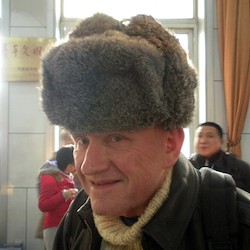
Walter Savitch, University of California San Diego Professor Emeritus of Computer Science and Engineering, passed away on February 1, 2021. He passed three weeks before his 78th birthday due to complications related to Parkinson's disease.
Savitch is remembered as a kind and patient advisor, a dedicated educator, a mentor and friend, and a world-class computer scientist. His deep insights into computational complexity and computational linguistics remain influential.
Savitch joined the UC San Diego faculty in 1969, and he played important roles in the development of computer science and related disciplines on campus. He was known for his kindness and for his mentorship of both new faculty and students. He was generous with his time; brilliant, yet approachable.
Academically, Savitch was best known for “Savitch’s Theorem,” that a non-deterministic Turing machine that used space S could be simulated by a deterministic Turing machine using space S2. He proved this theorem in his Ph.D. thesis under professor Stephen Cook at UC Berkeley. (A short writeup on Savitch's theorem is here.)
As a UC San Diego professor, he wrote several popular introductory computer science textbooks using the Pascal, C++ and Java languages. His wife, Patty Mahtani Savitch, worked as the managing editor of these textbooks. She and former students recall how hard he worked to continually improve these books in order to make core programming concepts as clear and understandable as possible.
Savitch was one of the first junior computer scientists hired onto the UC San Diego faculty. The department he was hired into was called the Applied Physics and Information Science (APIS) Department, which had started undergraduate and graduate programs in Information and Computer Science the previous year. APIS later changed its name to Electrical Engineering and Computer Sciences (EECS) and then in 1987 split into the Department of Computer Science and Engineering (CSE) and the Department of Electrical and Computer Engineering (ECE). In those early days, Savitch and his colleagues guided the emerging CSE department and set the stage for the department’s current prominence and well-deserved reputation for excellence.
As an expert in both computer languages and the natural languages humans speak, Savitch was a consistent leader in campus efforts to expand beyond Computer Science into what is now called Cognitive Science. Savitch began and directed the UC San Diego Interdisciplinary Ph.D. Program in Cognitive Science that became home to many students whose research combined these backgrounds. The active group of students and faculty associated with this program went on to make UC San Diego one of the first campuses anywhere to establish Cognitive Science as an academic department.
As both campus and his professional roles evolved, Savitch remained dedicated to the students he directly advised and taught as well as the many more students whose academic lives he touched through his textbooks. He was a treasured colleague to faculty at UC San Diego and elsewhere and gave a tremendous amount to the field. He was an exceptional listener, a genuinely caring person, and a great human being.
Savitch will also be remembered for his genuine humility, despite the fact that giants in theoretical computer science would go out of their way to acknowledge his presence and Savitch’s theorem in their talks.
His wisdom in committee meetings will also be remembered. When the temperature started to rise in certain meetings, he'd drop into his most New Hampshirite accent, smile, spread his hands out and say, "Well, you know, if we just don't write that down, we won't have to argue about it later.”
Savitch is survived by his wife Patty, his children Carmen, Timothy, Hae-Sook, and Javier, and his two grandchildren Luca and Francis.
He supported UC San Diego’s Chancellor’s Scholars Program as both a mentor and a donor, and could often be seen with his mentees at the Faculty Club long after his retirement. His family encourages donations to the program in honor of Walter Savitch.

